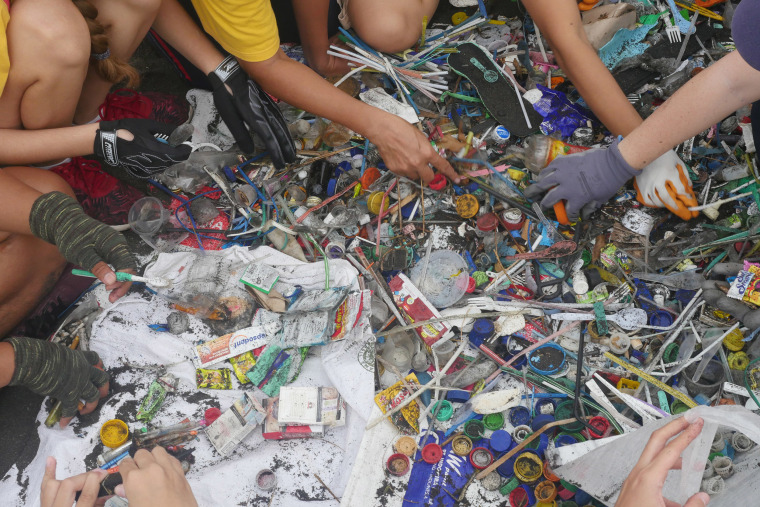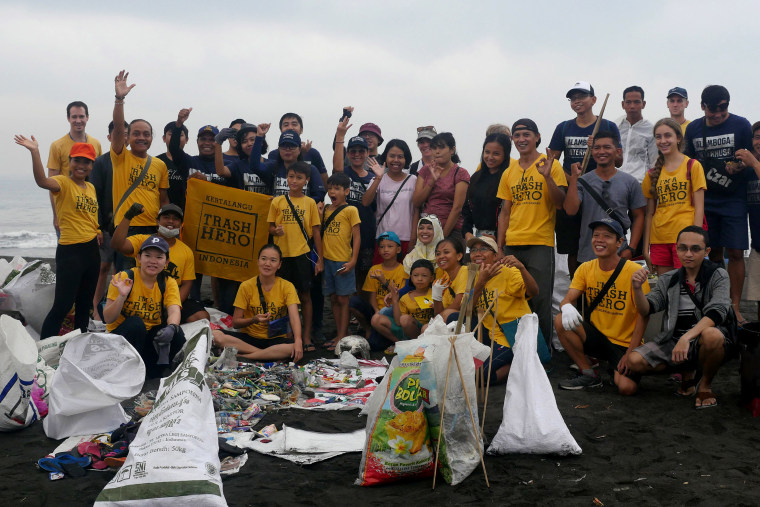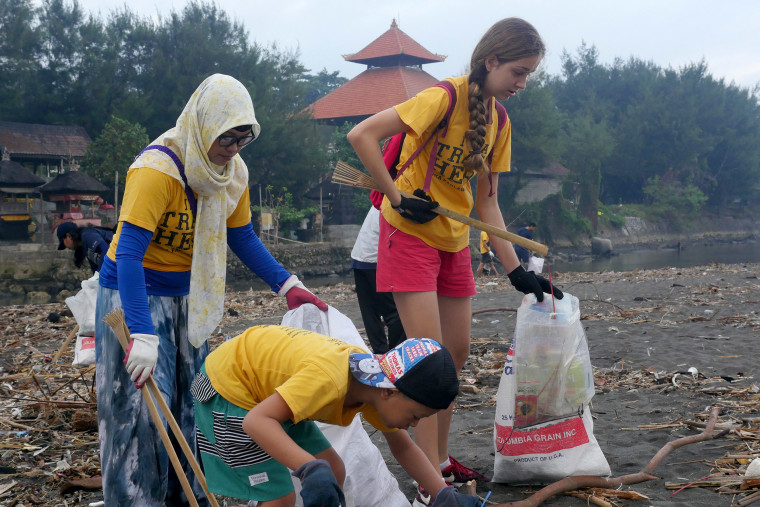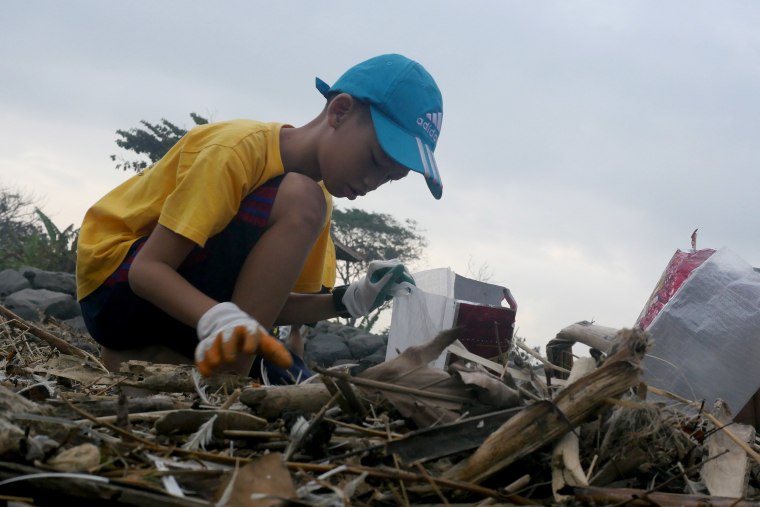DENPASAR, Indonesia — From a nearby clifftop, the luminescent waters of Bali’s Blue Lagoon glint and glimmer.
A closer look reveals the shimmer isn’t one of this Indonesian island’s many wonders but instead the sun reflecting off floating plastic. Every year this island, known around the world for its smoking volcanoes, picturesque rice terraces and elaborately carved Hindu temples, spills tens of thousands of tons of plastic garbage into its once-pristine waters.
It was in a bid to stem the crisis that Bali’s Gov. Wayan Koster announced a ban on single-use plastic bags, straws and styrofoam. His decree came in late 2018, shortly after footage taken by a diver swimming through great swaths of plastic debris off Bali’s coast went viral.

The regulation came into force in late June, and supporters hope it will make Bali a world-influencer in tackling marine plastic pollution. But, it is also a test to see whether small communities like this island can make a dent in what is a growing global crisis.
At a gathering of around 60 young environmentalists and journalists in an outdoor cafe and meeting venue on the outskirts of Bali’s capital Denpasar, musician and environmental activist Gede Robi Supriyanto stands in front of a large pile of plastic trash that he collected from the nearby beach and roadside in just 20 minutes. It's enough to fill a large black garbage bag -- but for obvious reasons, he collected it in a bamboo basket.
“Bali is in a state of waste emergency,” says the performer.
He and some of his fellow activists then start sorting the waste into piles — straws, rubber sandals, plastic juice cartons, syringes, diapers and single-use plastic shopping bags.
The pile of material suitable for recycling is tiny compared to the rest.
Raising the consciousness among locals on Bali builds on cultural respect for nature. It also builds on images of tourists sunbathing among washed-up plastic noodle pots, faded straws and tangles of unidentified plastic that have become all too common on an iconic island that has long drawn surfers, backpackers, yoga enthusiasts and beach-loving families.
“The change will happen if there is cooperation between the government, the people and the corporations,” he says. “Now the government and people have already changed.”
Activists are still waiting for corporate support, he adds, citing a recent legal challenge to the ban by a recycling organization, which was later rejected by the courts.
But while businesses with a vested interest in the plastic industry may be reluctant to adapt, activists have joined forces with a broad coalition of islanders to battle the garbage.

Upmarket hotels across the island now serve expensive cocktails with bamboo straws, while local students are reverting to carrying their lunches in metal tins rather than plastic wrapping
Many of the world-renowned temples on the predominantly-Hindu island are also getting behind the initiative, with religious leaders turning away devotees’ offerings wrapped in plastic, locals say.
As shocking footage of giant “islands” of plastic floating at sea and horrifying images of sea life with plastic embedded in their bodies raise awareness worldwide, it is easy to forget that this threat to human and marine well-being has accumulated in just a few decades.
In 1950, the entire world produced 2 million tons of plastic.
By 2015, global plastic production had ballooned to 381 million tons — a cumulative amount of 7.82 billion tons produced over 65 years. And most of this has been disposed of by burning or dumping in ways that lead to pollution of land, water and air, instead of via managed landfill sites or recycling.
Indonesia has played a significant role in this pollution. An influential 2015 report found the country to be the second largest contributor in the world to marine plastic pollution after China. The current Indonesian national government has since ambitiously vowed to cut plastic marine waste by 70 percent by 2025.
Banana leaves
At the Bintang supermarket in Denpasar, manager Wayan Budha Arthana — who goes by Budha — has helped implement a system of selling fruits and vegetables wrapped in banana leaves, as was once common in Indonesia and other parts of Asia, instead of plastic.
The store, which is popular with tourists and resident expatriates as well as locals, looks much like any other supermarket at first glance. A closer inspection reveals a colorful array of fresh produce, from lettuce to stems of lemongrass wrapped in dark green leaves.
Budha and a friend — the manager of another Bintang nearby in Seminyak — came up with the idea together, he says.
“We decided, Bintang is a good business — so we shouldn’t use plastic,” he says, and points to shelves of vegetables wrapped in banana leaves.
While some products are still reaching the shelves wrapped in plastic by their suppliers, Budha says now around one-third of the fruits and vegetables sold from the shop are wrapped in banana leaves. He expects that to grow.
“If we in Bali can set an example so all of Indonesia and other countries stopped using plastic bags too, that would be very good,” he says.

According to Denpasar Mayor Ida Bagus Rai Mantra, in June 2018 when he began introducing his anti-plastic bag measures, modern retail businesses were using a million bags every month. That, he says, has now fallen to 400,000.
“Do you want to know how I did it? By going out directly and checking and saying if you don’t want to help us, we can close down the store,” he says.
Mantra adds that with outright bans on plastic products discouraged by Indonesia’s ministry of industry, and potentially open to legal challenges from plastic producers, direct pressure on companies can be very effective.
But it is not all about pressure.
Rewards are also effective and although his initial initiative was aimed at modern retailers, he has also been visiting local traditional markets and distributing reusable bags.
Mantra says he has worked with counterparts in Thailand and Australia to share ideas on how to tackle the problem.
The mayor is also looking at a system to reward people who implement good waste-reducing and recycling habits.
“Those people will get first priority when they want to do something with government — like VIPs,” he says. “There could be scholarships, holidays, discounted cinema tickets.”
Bali’s ban goes beyond what is recommended in a national plan, but with the island accounting for just 4.2 million people among a total Indonesian population of 264 million, some might question whether an attempt to address the problem at the island-level will be too little to make a difference.
But new findings suggest local solutions can indeed play a big role in reducing plastic pollution on the island.
Researchers found that more than half of the island’s waste is burned or dumped irresponsibly, ending up polluting land, waterways and the ocean. And plastic accounts for almost 20 percent of the 1.6 million tons of waste created in Bali annually — and around 33,000 tons of that end up in the surrounding ocean each year, the study found.
The study also found that tourists also need to take responsibility. The industry, which brought around 16 million visitors to Bali last year, accounts for 13 percent of the island’s total waste. The average tourist generates three and a half times the waste than a local resident does.
Despite the very real impact of tourism and the fact that marine waste crosses national boundaries, local plastic bag bans can “work quickly,” says I. Gede Hendrawan, a professor in the marine sciences and fisheries department at Udayana University in Bali, who helped lead the research.
“Increasing local initiatives will generate a huge impact,” he says.
While the amount of trash already in the world’s seas remains a major environmental challenge, those involved in the recent research in Bali hope their findings will be a starting point for future action. It is expected that follow up studies will provide evidence on how effective the plastic ban and other waste reduction and management programs are in cutting the amount of plastic ending up in the ocean.
They also hope the Bali ban will encourage similar responses from communities around the world.
Ida Bagus Mandhara Brasika of the Bali governor’s Waste Management Task Force says he wants Bali to be a global leader in tackling marine plastic waste.
“The waste from Bali may be small compared to China or the U.S. But Bali is like a window for the world’s eyes,” he says. “Everyone loves Bali and we can show people that through changing our own behavior, even a small island can start something big and encourage others to do something they never thought about before.”
For now, those who have devoted their lives to tackling Bali’s marine plastic problem and keeping its world-famous beaches clean are determined to keep on with their efforts.
Putu Evie, 37, a volunteer with a branch of the Trash Hero movement in Denpasar, rises at dawn every Sunday and leads a group of local residents to collect garbage from Kertalangu beach where she lives with her husband and two children.
“It started with just me and the family working with the village head, teaching people in the community how to separate waste and pick up plastic from the beach,” she says.

Now, she adds, around 30 regular activists not only help in the weekly cleanups but also use social media to encourage others to get involved in picking up plastic in their own communities.
A traditional Balinese dancer and singer, Evie has been working to fight plastic pollution since before her children were born and has made tackling plastic pollution a part of her everyday life.
While she used disposable diapers when the boys were little, now that they are older they are involved in her efforts and often join her in the beach cleanups, she says.
Mantra, the Denpasar mayor, even credits Evie as an “inspiration” in his own plans to reduce plastic waste in the capital. His efforts, and now the governor’s islandwide ban, show that what begins as small-scale activism can help lead to major changes.
“We are flooded by plastic,” Evie says. “Implementing this ban is like turning off the tap rather than trying to keep mopping the floor all the time.”